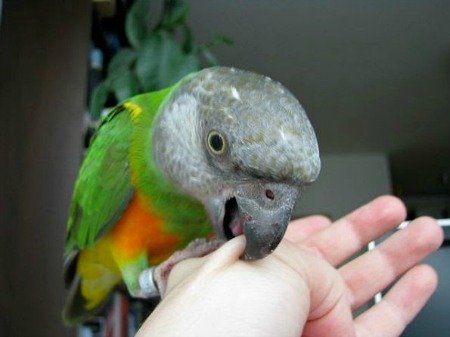Last Updated on by Mitch Rezman
Hi
I am hoping you can help. We have a parrotlet and he will be 10 months old July 3 (2017).
We haven’t had any problem till about a month or so ago. He is biting hard and lunges when we go to take him out or if he is out and we reach toward him he comes after us.
We were told to have his wings clipped which we did and that worked for about a week and a half then he started right back in they clipped his first five flight wings. He did good for a short time, then we took him back again and they clipped # 6 & 7 it helped about a week and he is right back to biting and lunging.
We took him to a vet to have him checked out to make sure he wasn’t sick and he is ok, they said it could be hormonal.
We are not sure who or where to turn to and it hurts us to leave him in the cage all the time. Do you have any ideas??
Thank you in advance
Tina G
HI Tina
Wing clipping never solves hormonal issues, it can only make them worse. A flighted bird will expend calories which reduces hormonal behavior.
To say clipping wings will some how change a bird’s attitude doesn’t make any sense. Feathers have no nerves.
No messages are being sent to the bird’s brain other than frustration.
The reality is the bird has a reduced sense of balance with half it’s wings.
Birds rely on a flight or fight mentality. If they know the can not escape danger (flight), they fight (bite).
No, wing clipping will not solve the behavior problems your bird is experiencing.
A bird that flies occasionally throughout the day will burn calories and be more tired (relaxed) thus less likely to exhibit hormonal behavior like biting and screaming.
Clipping wings can aid in flight training but that’s another story.
You say “we” a few times – do you you know if the bird has bonded with either one of you?
clicker training is essential
https://www.youtube.com/watch?v=OUaVdivyDsQ
also stick training
https://www.youtube.com/watch?v=wOvXt3IFnp8
please let me know “who’s the mate”
atg*****************@aol.com replied
Thank you for getting back to me. Not sure on the bonding.
When we first got him he was a baby he was born in august and we got him in sept I was working at the time do he was with my husband most of the time till I got home from work ,
I retired on May first and he was ok till about the third week of May then we were told to clip his wings and that seemed to help a little, we took him to the vet to make sure he was ok.
We went on vac may 26 to June 2 and since then he has been terrible. He is now mostly in the bird cage.
I can get him out of the bird once in awhile and he starts biting again so we have to put him back in cage.
He gets puffy, puts his wings back like he is going to attack so now I have home step up on a towel and put him back in cage.
editors note: this makes a bird fear the towel which may be needed for a veterinary emergency.
I can sometime calm him down by using a stern no and eventually I can pick him up.
editors note: the bird learned the meaning of NO from where?
My husband can do the same but it seems within a few minutes or so he starts attacking him.
I am sorry this is long but we love him to death and was hoping when we got him he could be out with us.
This is our first parrot we had two cockatiels previously and both have past.
Found out they are really different birds.(cockatiel vs parrotlets)
We are at our wits end not sure what to do. Should we let his wings grow?
Thank you
Tina
HI Tina
Birds are morally agnostic – thus a “stern no” is lost on them. I need to a few more parts to the puzzle
Has the bird been sexed – do you know it’s a he for sure?
What are his light cycle? How many hours of daylight and darkness?
How many bird cage toys?
What’s his diet? Seed based or parrot pellets.
Have you tried clicker training?
Is he offered any enrichment/foraging activities
https://www.youtube.com/watch?v=QCxNFRSvVe4
atg*********************@aol.com replied
Jul 3, 3:30pm
Hi
Thank you for your help.
Yes he is a male. He is a yellow and blue parrotlet and I have been told by the vet that males are yellow and blue.
He goes to bed at 6 or 6:30 his cage is covered then about 7 or 7:30 am we uncover him.
I cover with a brown sheet so I don’t think there is light that gets it but it might get lighter in the cage as the light outside comes in window
editors note: birds should not be subjected to total darkness. They need to navigate the birdcage at night for food and water.
He has four hanging toys, a round rope swing an a flat basket weave type of swing which he gets on one and jumps to the other one to swing.
He also has a spiral rope that goes from top to bottom of which he sleeps on the highest point.
His diet is a little seed , pellets, and human food. He use to come out and eat breakfast , lunch , and supper with us.
When he started to attack and bite I now put his plate in the cage. Once in awhile I can get he out when he steps on the plate then I put it on a tea table so he can eat aside with us.
Not sure what clicker training is or even where I might find a clicker.
No on the foraging how would I go about that?
We were told to clip his wings so we did first time was five flight feathers second time they clipped the additional # 6&7
Hope this helps. Thank you for helping me.
Tina
Atg…………[email protected]
Jul 3, 3:34pm
We have removed all that we can see the only thing left is we have a good size cage for him and his water dish is the stainless steel one which we see him trying to see himself. I wish they made plastic ones
Thank you again
Tina
Mitch Rezman
you replied GREAT RATING
Jul 3, 2:36pm
I would advocate removing all the reflective surfaces – the “other bird” may be contributing to stress
our Senegal parrot with a mirror- .
https://www.youtube.com/watch?v=meUz09L2lMk
atg****************@aol.com replied
Jul 1, 7:42am
Hi
We took the mirrors away and now he looks for anything that he can see his face in like plastic gold coins he can flip, his stainless steel water dish etc it seem like he thinks about something then attacks if you try go near or move anything if his
Thank you for your help
Tina
Mitch Rezman
you replied
Jun 30, 10:37pm
you
Let’s remove the mirror for now – he may be responding to additional “threats from the other bird in the cage”
Also, every time you go by the cage, drop a high value treat in a feeder dish like an almond or lafeber nutriberries
atgr************@aol.com replied
Jun 30, 4:19pm
Hi
Just sent email but forgot to include a note he used to have a mirror he played with and we took it away as we were told and now he looks for anything he can see his face in.
Not sure if that is what was causing it and we are hoping he will eventually come back to us as normal. At times he is real lovable then he turns on us.
Thank you again
Tina Grenier
at************@aol.com
Hey Tina
I have found that birds don’t really turn on us, we provide triggers. As an example Peaches our Senegal parrot loves me and hates Catherine and all other humans.
If Peaches is on my shoulder and Catherine passes too close to me, say in the a hallway I feel a rough hypodermic needle like piercing pain in my neck.
That’s Peaches saying “how dare you interact with that woman”
Now if I have Peaches on my shoulder we make it a point to stay at least 3 feet away from each other – the biting has ceased.
You want to examine the reason your bird “turned on you”. What were the circumstances. Where was the bird?
The vacation time may have triggered this episode – which will pass.
Getting birds out of the bird cage sometimes can be problematic. Stick in hand in a cage to pull the bird out sometimes is not an well for the.
Birds process thought literally three times faster than humans (and all other mammals). We found that they have three times more neurons. Thus when we get bit – which is never acceptable, we have to ask – why?
If the fleshing out is a constant problem the simplest place to start is with clicker training.
Three or four minutes a day five days a week will change the relationship between you and your bird, I promise
best
mitchr
Author Profile
Latest entries
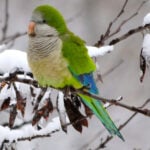 The Traveling BirdJune 26, 2025Can You Name 5 Parrot Species That Are Living Wild in the USA?
The Traveling BirdJune 26, 2025Can You Name 5 Parrot Species That Are Living Wild in the USA?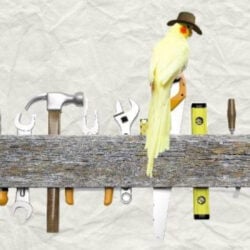 Bird BehaviorJune 26, 2025How is it Parrots Are Problem Solvers Social Animals and Even Use Tools?
Bird BehaviorJune 26, 2025How is it Parrots Are Problem Solvers Social Animals and Even Use Tools?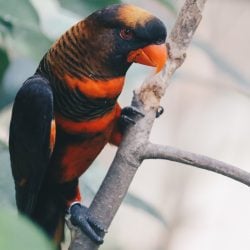 Bird & Parrot AnatomyJune 25, 2025How a Tiny Chemical Modification Makes Parrots Nature’s Living Paintings
Bird & Parrot AnatomyJune 25, 2025How a Tiny Chemical Modification Makes Parrots Nature’s Living Paintings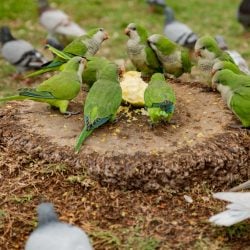 PigeonsJune 20, 2025How Do Parrots Thrive in Cities Outside Their Native Habitats?
PigeonsJune 20, 2025How Do Parrots Thrive in Cities Outside Their Native Habitats?
